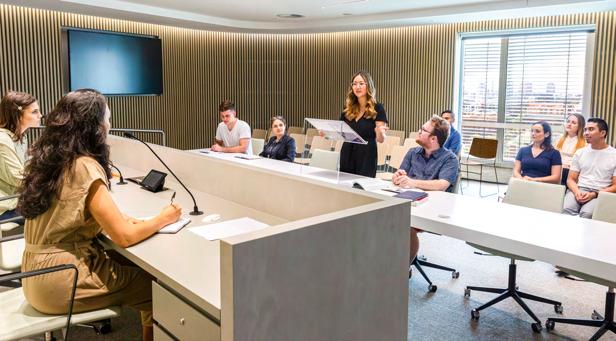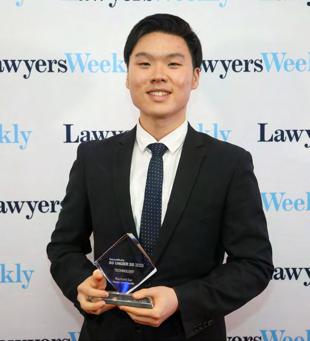UTS LSS Careers Guide




1
2023
Acknowledgment of Country
The UTS LSS acknowledges the Gadigal people of the Eora Nation upon whose ancestral lands our university now stands. We would also like to pay respect to the Elders both past and present, acknowledging them as the traditional custodians of knowledge for these places.
Authors & Acknowledgments
Careers (Publications) Director: Alyssya Warty-Hasan
Subcommittee:
Menath Nimnaka Jayawardana
Mollie Galvin
Clairessa Ng
Nipun Kaur
Samiksha Vaidya
Olga Makin
Joshua Harrison
Akhila Jaimes
Mohammad Amir
Designer: Ashley Bokser
President: Georgina Hedge
Vice-President (Careers): Miranda Clinton
Vice-President (Sponsorship): Georgia Neaverson
Dean of UTS Faculty of Law: Professor Anita Stuhmcke
Welcomes Dean Of Law 4 President 5 Careers (Publications) Director 6 Introduction Practical Legal Training + Admission to Practice 8 Job Searching 9 Resume Building 12 Networking 13 Legal Practice Areas Corporate and Commercial Law 15 In-house 17 Technology Law 17 Criminal Law 20 Government Law 21 Family Law 22 Media Law 23 Humanitarian and Human Rights Law 23 Environmental Law 25 International Law 26 Migration Law 27 Pro Bono 27 Health Law 28 The Bar 30 Non-Legal Practice Areas Preface 31 Academia 32 Policy 34 Consulting 34 Finance 35 Journalism 35 Startups 37 Not-for-Proft Organisations 37 Sponsors 37 Contents
Welcomes
Welcome to the UTS LSS Careers Guide 2023. It is my pleasure to introduce this Guide as it provides excellent insights and handy tips for any application you may make across the wide range of career paths that open following your law degree.

The value of your legal qualifcation is both tangible and intangible. Indeed, the value of the UTS Law degree is both a legal qualifcation and a legal education. A legal qualifcation ofers you the possibility of a career in law or a related feld. This is the most tangible outcome of your legal studies. Yet, the ‘intangible’ benefts that your legal education will yield is equally signifcant. A legal education provides life-long skills that will be immensely benefcial throughout your professional and personal life. So, it is with pleasure I invite you to read this Guide from cover to cover. It is full of opportunities and ideas as to how you may apply both your legal qualifcation and your legal education. It ofers many traditional and non-traditional career pathways for you to explore, addressing the wide range of professional possibilities open to you through your study of law at the UTS Faculty of Law. My congratulations to the UTS Law Students’ Society for once again putting together such an important and interesting Guide.
Your degree/legal qualifcation from the UTS Faculty of Law is highly sought after. I regularly receive very positive feedback from law frms, judges, NGOs, and alumni about the quality of UTS Law graduates. Articulate, work ready, industry focused and good team players are just some of the positive attributes listed. The feedback confrms what we know to be true of the UTS Law degree – that it is high quality legal education, intellectually rigorous with an emphasis upon skills.
You may choose not to practice law – or you may begin to practice and move on to something diferent. The skills of UTS Law graduates are transferable and valuable across many professions, industries, and diverse career trajectories. So, please take the time to consider the options in this Guide and never be afraid to deviate or try something new. UTS Law has the highest percentage of graduate employment of any Sydney-based law school. I encourage you to be confdent in your skills, the knowledge you have gained through your studies at UTS and to make the most of the opportunities available to you due to your UTS legal education.
4
CAREERS GUIDE 2023
Prof. Anita Stuhmcke Dean Of Law
Welcome to the UTS LSS Careers Guide for 2023!
A career in the legal profession is dynamic and diverse; there is not one correct pathway, or one destination that is more desired than another. A UTS Law degree provides students with access to a wide range of opportunities and pathways to a legal career. In recognising this, the UTS Law Students’ Society aims to provide members with access to careers events and initiatives from a diverse range of legal sectors. One of these key initiatives is the fantastic publication you are currently reading, the UTS LSS Careers Guide! The Guide aims to provide students with a wealth of information about all kinds of legal careers, and looks to assist students at any stage of their degree they might be up to.

I would like to thank all of the people who have worked tirelessly to piece together this Guide, in particular, Careers (Publications) Director, Alyssya Warty-Hasan, Vice-President (Careers) Miranda Clinton, designer Ashley Bokser, and the amazing members of our Careers (Publications) Subcommittee. Finally, I would like to extend a huge thank you to our sponsors for their support of our Careers Guide, as well as all of our other fantastic LSS events and initiatives. The support of our sponsors makes resources like these possible for our wonderful members.
Whether this Guide provides you with exposure to a potential new area of interest for your career,
or simply gives you tips on how to build your career, I am confdent that you will fnd something interesting and new to consider. I would also encourage everyone to attend the UTS LSS’ Beyond Corporate Careers Fair, which will provide students with the exciting opportunity to hear from diferent legal professionals from a diverse range of legal industries.
Happy reading, and I wish you all the best of luck with your future careers!
5
UTS LSS
Georgina Hedge President
I am delighted to welcome you to the 2023 UTS LSS Careers Guide. It is with great pleasure that I introduce you to this invaluable resource. This Guide will provide you with an understanding of the many opportunities that await you upon completing your Law degree.
Your UTS law degree is a powerful asset that will open doors and pave the way for a successful career. As you embark on this exciting journey, it is essential to be well-informed about the diverse paths you can pursue, both within the legal feld and beyond. This Guide has been crafted to showcase the various legal and non-legal avenues available, equipping you with the knowledge to make informed decisions about your future.
I want to take this opportunity to thank our sponsors for their valuable contributions and the insights they have provided. A big thank you to our Careers (Publications) Subcommittee (Menath, Mollie, Clairessa, Nipun, Samiksha, Olga, Joshua, Akhila, and Mohammad), and our designer Ashley Bokser for their eforts in helping create this Guide for our readers. Finally, I would also like to thank the Law Faculty Dean, Professor Anita Stuhmcke, our President, Georgina Hedge, and our Vice-President (Careers), Miranda Clinton, for their support.
As you explore the pages of this Careers Guide, I encourage you to embrace the numerous possibilities that lie ahead. Whether you pursue a traditional legal career or venture into uncharted territories, we hope this Guide inspires you to make informed decisions and inspires you to reach new heights of success.
Wishing you luck with all your future endeavours, and happy reading!
Alyssya Warty-Hasan Careers (Publications) Director

6
CAREERS GUIDE 2023
INTRODUCTION


Practical Legal Training (PLT) + Admission to Practice
There are three main steps to being admitted into practice as a solicitor in New South Wales. These include:
1
Completion of a Bachelor of Laws degree or its equivalent
2 Meeting the defnition of a ‘ft and proper person’
The Legal Practitioners Admissions Board determines whether you are a ‘ft and proper person’ to practice as a lawyer with regard to numerous factors set out in the Legal Profession Admission Rules 2015 (NSW) and part 2.2 of the Legal Profession Uniform Law (NSW).
3
Completion of your Practical Legal Training (PLT) program
• Your PLT can be completed at UTS. It is also ofered by many institutions such as the College of Law.
• For students completing a stand-alone UTS Bachelor of Laws (not a double degree), you have the option to complete the PLT in your fnal session of study.
• The PLT involves coursework and a practical component.
8 CAREERS GUIDE 2023
Job Searching
Embarking on your journey into the legal world? Do not worry, it is never too late to start building your legal experience! There are countless opportunities to explore during your studies that can nurture your legal skills and fuel your passions. You will fnd roles like paralegals, legal clerks, research assistants, and legal secretaries, each providing invaluable experiences for aspiring legal professionals.
Wondering where to fnd these opportunities? Look no further! Here are some fantastic platforms that can start your legal career:
1. UTS Careers: UTS Careers is your go-to destination for job hunting. Their Careers Hub ofers a plethora of job listings, from graduate positions to clerkships and even casual or part-time roles. As a law student, you can dive into the Law Career Hub, specially curated for legal opportunities. Stay updated with the UTS Law Students’ Society’s regularly updated ‘Job Opportunities’ page too!
2. Seek: Seek, Australia’s leading job portal, caters to various industries, and law is no exception! As a law student, it is a treasure trove of law-related job openings. You can set up job alerts, get expert career advice, and easily showcase your skills by building and uploading your resume. Connect with potential employers and discover the multitude of job opportunities waiting for you in the legal feld.
3. LinkedIn: Elevate your networking game with LinkedIn, the professional platform where your profle takes centre stage! Craft an online resume, connect with law professionals and frms, and seize job opportunities in real-time. Law frms and legal experts frequently post job openings here, ofering you a direct line to your dream legal career. Engage in discussions and follow law-related organisations to expand your network and open doors to exciting legal prospects.
4. Legal Vitae: As a specialised job portal and networking platform for law students and professionals, Legal Vitae is tailored to suit your legal ambitions. Showcase your academic achievements, work experience, and legal skills in detail. Explore an array of law-related job vacancies, internships, clerkships, and other career opportunities. Employers and law frms also use Legal Vitae to seek potential candidates with your qualifcations and expertise, making it a valuable resource on your path to success.
5. GradConnection: Geared towards university students and fresh graduates, GradConnection covers various industries, including law. In the dedicated legal section, you will fnd entry-level positions, internships, and graduate programs ofered by law frms and organisations. Utilise flters to refne your job search based on your preferences and qualifcations, making the hunt for legal openings a breeze. Their career resources and articles will prepare you for the job search and application process, ensuring you put your best foot forward.
9 UTS LSS
RESUME CHECKLIST
Use this list to check that you have completed a professional resume and have tailored it to the position/role. Remember you can move areas of your resume around to highlight the most relevant information for the position.
Have you captured the employer s attention on the frst page with your most relevant experience and skills?
Does the resume look tailored and not based on a standard template? Is the information relevant to the hiring manager s needs, as opposed to a one si e fts all document?
Did you include relevant keywords and appropriate industry terms?
Is the resume without any careless typos, spelling, grammar or syntax errors?
Did you avoid writing the resume in an implied frst person voice with personal pronouns (I, me, and my)?

Does the resume provide a visually pleasing, professional presentation? Is the resume inviting to read, with clear sections and ample white space?
Is a career summary included so the reader immediately knows your value proposition (recommended for later lawyers, career changers)?
If this is a resume for a career change, does it include supporting details that show how your past experience is relevant to the new job?
Is the resume s length and overall appearance appropriate given your career level and summary ( pages as a guideline)?
Are there design elements (bullets, bolding, lines, margins) to guide the readers eyes through the document and highlight important content?
Does your resume contain key headings? Is the page break formatted correctly so it doesn t break up sentences?
Is your career history listed in reverse chronological order (most recent job frst), with your legal experience frst?
Are your achievements distinguished from your responsibilities? emember achievements are outcome focused and over and above your day to day responsibilities
Are achievements quantifed by using numbers, percentages, dollar amounts, or other concrete measures of success?
Do achievement statements begin with strong, varied action verbs? eg. developed, delivered, managed?
collaw.edu.au/PLT
COVER LETTER CHECKLIST

Use this list to check that you have completed a professional cover letter and have tailored it to the position/role. Remember to always address the selection criteria required for the position.
Does your letter show your genuine interest and enthusiasm for the job / organisation?
Does your letter look tailored to the role / organisation and not based on a standard template?
Does your letter try to build a connection with the reader? Does it diferentiate you enough?
Does your letter show your research and knowledge of the organisation beyond a quick google search?
Does your letter present you in a positive light and as a good ft for the organisation and role?
Is your letter one A4 page long with no more than 4 paragraphs?
Does your letter have the right tone? (read out loud to check)
Have you taken out any information about yourself that might highlight any gaps / weaknesses?
Have you included your contact phone number and professional email address?
Is the cover letter addressed to the correct person with their title, address?
Have you commenced with the correct greeting? eg. Dear Ms Slater
Have you included the title and reference number of the job?
Does the employer know why you are applying for the position and where you saw the position?
Have you included your education, qualifcations and current study?
Have you provided specifc evidence of your skills for this specifc job and written about them without exaggerating?
Have you highlighted your most relevant work experience frst, ie. legal?
Have you included the most relevant and recent achievements that promote you well?
Have you addressed any other requirements of the job? eg. global relocation, etc
Is your letter grammatically correct with no spelling or typing errors?
Have you had someone proof read it just in case?
collaw.edu.au/PLT
Resume Building
The resume is an obvious but essential element required in the entrance process for just about every job and career.
Generally, your resume should be concise but informative with all the highlights of your career to date.
You should also include a short, personal career summary. It should summarise your past experiences and briefy address your future career ambitions. Ideally, your ambitions should be in-line with the opportunity you are seeking in order to highlight to employers your relevance and desire for the role.
The length of the resume should generally be one page. As such, be careful not to overload your resume - pick and choose the most important and relevant experiences and information for your best chance to succeed.
You do not need to provide a heavy description of your experiences as they should be talking points you address in your interviews.
Things you should look to include in your resume:
• Work experience - Irrespective of legal or non-legal work experience, all work experience will be looked upon positively. It provides evidence of your abilities to commit to a job and reveals all the experiences you have gained.
• Education - It is important to list all formal education you have participated in. This includes high school and university. Short courses which are accredited can also be added.
• Volunteering - This is often looked at positively by employers as it shows selfessness and commitment. Ensure to include volunteering experiences in the community and at university - do not forget to include the Brennan Justice and Leadership Program!
• Extra-Curriculars - Employers are often impressed by an individual’s commitment to extra-curricular activities. This would include sporting participation, artistic engagement and more. The UTS Law Students’ Society’s competitions are also highly regarded among professionals. From subject mooting to witness examination, if you have any experience in competing in them it would be highly benefcial to include in your resume. Make sure to use your judgment to determine whether the experience is relevant.
12 CAREERS GUIDE 2023
Networking
Networking is a term used to describe building connections with like-minded people as a way to help further your career. It is a great way to develop a better understanding of potential career paths available to you as a law student. It allows you to seek advice and mentorship from people in the same feld to expand your career knowledge and inspire new ways of working. Networking is also an important part of staying engaged and actively participating in the feld. It allows you to connect with others and stay in the loop whilst supporting the development and progression of everyone’s career. Networking also improves your overall confdence and communication skills, which are invaluable skills.
Your network can include other law students, tutors, and co-workers. A great way to network is through volunteer work, especially in an area of law in which you are interested in pursuing a career.
The UTS LSS ofers a series of networking events, like the UTS LSS Clerkship Networking Event. Although expand your networking beyond just these events - networking can take place anywhere. Try and get comfortable networking earlier on in your career as it will pay of in the long run.
Some tips for networking include:
• Be open minded when networking and connect with people from various felds.
• Show a genuine interest in other people and aim to establish common ground.
• Have some familiarity with legal trends and industry issues which can be discussed.
• Ask questions and actively listen.
• Share contact information and maintain the connection.
13 UTS LSS
LEGAL PRACTICE AREAS

Corporate and Commercial Law
Corporate lawyers support their corporate and business clients by advising and representing them through periods of adversity or change. They also provide assistance in the decision-making processes of the business through a legal perspective. It is a corporate lawyer’s primary duty to ensure their client understands and applies all relevant regulations to them.
The clients of a corporate lawyer are typically medium to large businesses. They may work with small businesses too, however, commercial lawyers are more often sought.
For a lawyer, it is a high-paced work environment that ofers great learning experiences and rewards too. Especially due to needing to deal with a variety of aspects of corporate law and businesses, corporate lawyers are very well regarded and highly sought after. It is important to develop your oral and written skills for this area of law. Dealing with clients is a very important skill to have!
There are various diferent areas of corporate law which also allows the lawyer to continuously learn new skills as well as fnd their passion within corporate law.
Some of the areas of corporate law are:
• Administrative law
• Banking and fnancial services
• Bankruptcy and Insolvency
• Building and Construction
• Commercial and Business Law
• Company management and compliance
• Intellectual Property
• Mergers and Acquisitions
• Technology and Privacy
15 UTS LSS
Graduate program
Enjoy a one year structured program with extensive on-the-job training and support in completing Practical Legal Training.
Elevate Program provides regular learning opportunities designed to develop graduates by providing skills and expertise to excel.
A comprehensive national induction program which lays the foundation for the year ahead.
Multiple rotations gives you the opportunity to gain experience in several of the firm’s practice areas.
A strong support network including a buddy, mentor and supervising partner to provide guidance throughout the year.
Opportunities to participate in pro bono and Smarter Law initiatives.

Life at Hall & Wilcox offers a range of benefits and initiatives to support the holistic well-being all of our people.
HW Evolve is a hybrid workplace where our people are encouraged and empowered to work flexibly both remotely and in the office.
Grads on Tour is a Smarter Law event that allows graduates to experience the innovation journey by taking an idea to reality.
Scan the QR code to visit our Careers page
In House Law
Unlike lawyers in commercial frms, who work for a variety of clients, in-house lawyers are responsible only for the legal requirements of, and can only provide legal advice to, their direct employer. This is often an organisation and, often, its related bodies corporate. In-house lawyers currently make up about 25% of all legal practitioners in Australia.
The skillset required by in-house lawyers is diferent from that required by their counterparts in private practice. Where private practice lawyers are expected to advise and represent multiple clients, in-house lawyers are only responsible for one. They need to take on a more rounded role as a member of the business. This can mean taking responsibility for project management, branding, and business development tasks. In-house Lawyers often have a seat at the decision-making table.
If you are passionate about all things business and corporate law, then this may be the path for you!
Technology Law
Technology law is an interesting practice area which governs the use of technology and its impact on various settings. Tech law considers emerging technology, cyber crimes and security, online privacy, facial recognition, and intellectual property matters.
Tech law is an exciting area to practice in due to the advent of artifcial intelligence and other emerging technologies, meaning this practice area is set to expand and evolve signifcantly in the coming years. A career in tech law also has the potential for global reach.
A day in the life working in this practice area would involve using existing skills and knowledge to analyse complex legal problems and apply legal frameworks to new technologies. For example, you may help a client implement new healthcare technology for their business and ensure it complies with Australian regulations. A day in the life of a tech lawyer may also involve providing recommendations to the Australian government about digital privacy and data retention schemes.
“I did an internship at AustLii in 2022 where I witnessed how technology, and the law can be used to improve access to free legal information. AustLii is an example of an Non Governmental Organisation that uses technology to promote access to law. During my time interning at AustLii, I was introduced to new artifcial intelligence technology called ‘Rules as Code’ which aims to generate legal advice based on legislative principals in areas of public law, such as for the Fair Work Commission.”
- Olga Makin -
17 UTS LSS
Choose your next move wisely
Our business model is di erent to other rms. We o er our graduates the opportunity to get hands-on experience, working on market leading legal work in a down-to-earth environment where people thrive.
jws.com.au

18
A BETTER PLACE TO WORK
19 UTS LSS Life with us has more bene ts than just working for a large corporate rm. We will put you at the forefront of Australian commerce, working with our clients on their most complex and business critical legal work. Experience a full-service firm jws.com.au A BETTER PLACE TO WORK Employment Foreign investment Dispute resolution Finance Corporate crime & investigations Intellectual property & IT Tax Competition & antitrust Energy & resources Environment & planning Projects Real estate Restructuring & insolvency Corporate M&A Funds Management Private equity & Venture capital
Criminal Law
Defence:
Stepping into the realm of criminal law in New South Wales opens the door to a dynamic career as a criminal defence lawyer. Each case will bring unique challenges and opportunities to advocate for the rights of the accused.
As a frequenter of the courts, you will navigate the intricacies of criminal proceedings, building a robust defence strategy for your clients. You will engage in various tasks from initial client interviews to conducting extensive research and crafting persuasive arguments.
Your career will entail engaging with diverse clients, from those accused of minor ofences to high-profle criminal cases. You will try to achieve the best possible outcomes for your clients, fostering a profound impact on their lives. Embracing the complexities of criminal law, you will collaborate with legal teams, investigators, and experts, refning your advocacy skills.
Prosecution:
Aspiring prosecutors in New South Wales will fnd a fulflling and rewarding career in criminal law.
Working closely with law enforcement agencies, you will gather evidence, craft persuasive arguments, and prepare cases for trial. As the voice of the State, you will present arguments to hold ofenders accountable for their actions, seeking to protect the community from criminal activities.
In this fast-paced area, you will encounter a wide spectrum of criminal cases, from petty thefts to serious criminal charges, each necessitating meticulous attention to detail. Collaborating with witnesses, victims, and legal colleagues, you will weave together the narrative of a case.
In New South Wales, a career in criminal law, whether in defence or prosecution, ofers an opportunity to make a profound impact on people’s lives and the justice system as a whole. Whichever path you choose, the dynamic nature of criminal law will keep you on your toes.
20 CAREERS GUIDE 2023
Public, Administrative and Government Law
Government law in Australia is a practice area that focuses on the legal framework governing the relationship between the government and its citizens. It encompasses a wide range of legal matters, including constitutional law, administrative law legislative drafting, regulatory compliance, and policy development. Government lawyers play a vital role in ensuring the proper functioning of government institutions, protecting individual rights, and promoting the rule of law. The desire to understand what underpins a functioning society can entice those with an interest jurisprudence and a passion for working on matters that directly afect public life to apply for roles within one of the many Commonwealth Government departments.
The work of government lawyers involves providing legal advice and representation to government agencies, departments, and ofcials. They serve as trusted advisors, interpreting and applying laws, regulations, and policies to guide decision-making processes. Government lawyers are responsible for ensuring that government actions are lawful, fair, transparent, and aligned with constitutional principles.
One key aspect of government law is constitutional law. Government lawyers deal with issues related to the interpretation and application of the Australian Constitution. They analyse constitutional provisions, advise on the division of powers between the Commonwealth and the states, and address constitutional challenges. This requires a deep understanding of constitutional principles, including the separation of powers, federalism, and the protection of individual rights.
Administrative law is another critical component of government law. Government lawyers navigate the complex web of administrative decision-making, ensuring that government bodies and ofcials act lawfully and in accordance with procedural fairness. They handle matters such as administrative appeals, judicial reviews, and access to information requests. Administrative law principles, such as natural justice and the duty to provide reasons for decisions, guide the work of government lawyers in this area.
Legislative drafting is another key responsibility of government lawyers. They are involved in drafting and reviewing legislation, regulations, and other legal instruments. Government lawyers ensure that proposed laws are clear, consistent, and compatible with existing legal frameworks. They work closely with policymakers, providing legal expertise to ensure that legislation meets policy objectives while adhering to constitutional and legal requirements.
Government lawyers also play a crucial role in regulatory compliance. They assist government agencies in understanding and complying with regulatory frameworks in areas such as consumer protection, competition law, environmental regulations, and workplace safety. They develop compliance strategies, provide guidance on legal obligations, and handle enforcement actions when necessary.
Policy development is another signifcant aspect of government law. Government lawyers contribute to the formulation and implementation of government policies. They assess the legal implications of proposed policies, review draft policies for legal soundness, and provide advice on policy options.
21 UTS LSS
Further, government lawyers help ensure that policies are consistent with legal requirements and efectively address public concerns. In addition to legal research, analysis, and advice, government lawyers engage in various tasks daily. They draft legal documents such as contracts, opinions, and correspondence. They attend meetings and consultations, providing legal insights and support in decision-making processes. Government lawyers also handle litigation and dispute resolution matters, representing government agencies in court proceedings.
Overall, the practice area of government law in Australia entails a wide range of responsibilities, including constitutional interpretation, administrative decision-making, legislative drafting, regulatory compliance, and policy development. Government lawyers play a vital role in upholding the rule of law, protecting individual rights, and ensuring the efective functioning of government institutions. Their work involves providing legal advice, conducting research, drafting documents, representing government agencies, and contributing to policy development.
By combining legal expertise with an understanding of government processes, government lawyers help shape the legal framework within which the government operates.
Family Law
The Australian family law system helps people resolve the legal aspects of their family relationship issues, including its breakdown. However, as a practice area, it encourages people to agree on arrangements to avoid going to court. Family law is a dynamic and challenging area of law as you’ll be at the forefront of infuencing society’s objectives and cultural values.
Family law tends to delve more into the personal side of working with clients. Successful family lawyers rely on their strong interpersonal skills to help navigate through the trials and tribulations of relationship breakdown and related challenges. Family lawyers must be empathetic, resilient, adaptable, and able to communicate with their clients clearly and compassionately, as the matters are almost always emotionally charged.
As a family lawyer, you will help your clients with property disputes and settlements, fnancial agreements (pre and post-nuptial), post-separation parenting agreements, and child support disputes and agreements. Family law matters often intersect with other practice areas such as child protection, criminal law, estate planning, and business law.
You will regularly draft letters of advice, settlement agreements and consent orders, court documents and afdavits, binding fnancial agreements, parenting plans, and correspondence with other lawyers. Further, you will also use strong negotiation skills to resolve matters and manage all litigation phases. Additionally, you will counsel clients and help them understand their legal rights and responsibilities to reach an agreement without going to court. It is also essential that you can advise clients when it is necessary to go to court.
Family lawyers are in high demand. You can choose to work in specialist family law frms or mid-sized frms with a family law team. Otherwise, you can work in governmental or non-proft legal service organisations representing vulnerable clients. There is an assurance of stability in this practice area.
22 CAREERS GUIDE 2023
Media Law
Media law concerns the regulation of mass media, including newspapers, flm, radio, and marketing. While media law traditionally covered a well-defned area, the advent of the internet has facilitated the opening of new areas within the feld. Consequently, the feld has become popular for many lawyers interested in the interaction between technology and media in our contemporary society.
One of the largest areas that media lawyers regularly deal with is intellectual property. While juggling many diferent responsibilities, their main role involves protecting the intellectual capital of their clients.
Defamation is also a key area of media law. In recent years, this area has become particularly prominent following various high-profle cases and the expanded use of defamation due to the increased use of social media. Most social media cases deal with written statements or libel, while the more ‘traditional’ means of media law more commonly concern verbal statements.
Therefore, defamation lawyers are tasked with protecting their clients’ reputations, preventing the proliferation of defamatory content, and helping to repair their reputations.
Humanitarian and Human Rights Law
Humanitarian and human rights law focuses on protecting and promoting human rights. As a practice area, it is central to social change and policy making. Due to the global nature of most infuential human rights bodies, humanitarian and human rights law often intersects with international law.
As a human rights lawyer, you will work to shape legislation and challenge human rights violations to ensure that every person has access to their fundamental and inalienable rights. Human rights lawyers often contribute to public policy debates and spend much time on law reform work and submission writing.
You will often work with vulnerable or marginalised groups and use your understanding of the law to advocate for clients who have experienced inhumane treatment.
To be a lawyer specialising in human rights, you must handle all duties related to advocating for your client’s rights. It could be as simple as meeting clients to discuss legal needs and advising them about their rights or as complex as recording witness statements, preparing physical evidence, and negotiating fnancial compensation and settlements. You may occasionally serve as a consultant on human rights legislation or organise public support and demonstrations to bring attention to human rights violations.
A successful human rights lawyer will have strong public speaking, research, critical thinking, and organisational skills. If you are passionate about protecting and promoting the rights of vulnerable people, pursuing a career as a human rights lawyer may be the best ft!
23 UTS LSS
I meet up with other graduates during lunch, where we discuss our week ahead and plans we have for the weekend.
A DAY IN THE LIFE OF A GRADUATE DISCOVER. DEVELOP.
THRIVE. THE K&L GATES EXPERIENCE.
I recently became a Lawyer in the Real Estate group in Sydney. I primarily act for investment funds, asset managers, listed real estate groups and property developers. I have a number of years’ experience working in the property sector, and have particular expertise in acquisitions and disposals of a diverse range of assets, title structuring and subdivisions, projects due diligence and transactions and complex leasing. This is a day in my life as a Graduate Lawyer at K&L Gates.”

As a morning person, I prioritise waking up early enough to go to the gym or fit in a run before leaving for work. I find it is important, especially during busy periods, to move my body and enjoy some time away from the screen.
I arrive at work early to get a head start on the day, create a to-do list for urgent tasks, and action any emails from clients in different time zones. I also take some time to read the latest commercial property news in the AFR and similar publications. K&L Gates is strongly focused on developing lawyers with a strong commercial acumen and understanding.
I grab breakfast with colleagues from the buffet selection provided by K&L Gates under the Konnect - Breakfast and Barista program.
My first task of the day is preparing for an upcoming settlement of a large commercial asset in Sydney. I have various deliverables, including preparing e-conveyancing aspects of the transaction via PEXA, drafting ancillary documents to the contract for sale, and maintaining an up-to-date completion checklist.

I attend the Library and Research Services Graduate Training Session, where the in-house librarians teach us about legal research software and best practices when dealing with complex legal research.
Our Corporate team needs a due diligence report for the proposed acquisition of an energy company. I undertake searches of the relevant statutory bodies in relation to the land required for the project, noting any material issues that may have risen.
I prepare the first draft of commercial leasing documents for an investment fund client owning multi-story tenancies in Sydney. I prepare these documents by marking up precedent templates previously settled with the client.
I meet with a Senior Associate in my team to discuss my proposed amendments to the precedent documents and offer advice on any points of concern.
After reviewing the documents with my supervisor’s comments, I prepare a draft email attaching the documents to be sent to the client and forward this to our Partner for final approval. I find it invaluable to review my Partner’s further amendments to ensure that I learn from any changes and how to implement these in future.
I dial into a call with a client and several K&L Gates lawyers to discuss a completion date for our client’s takeover of a company. We advise on the property aspects that arise from this transaction, including undertaking the assignment of the leases and occupation agreements from the seller to our client.
Once the call is concluded, I discuss the outcome with our Partner and map out an action plan moving forward. I update my file notes of the conversation and save it to the matter, as well as updating the completion plan and circulating the updated checklist to our client and team.
I send a few final emails and check in with my team to see if anyone needs assistance before heading home for dinner and time with family and friends.
LUNCH 6:00 AM 7:45 AM 8:30 AM 8:45 AM 10:00 AM 11:00 AM 2:00 PM 3:30 PM 4:00 PM 4:15 PM 5:00 PM 5:45 PM 1:00 PM klgates.com
Reilly King, Lawyer Graduate Lawyer (2022), Seasonal Clerk (2020/2021) Studied: Bachelor of Law/Bachelor of Arts
REQ2088
Find out more at https://www.klgates.com/australia-graduates
Environmental Law
Environmental law is an emerging novel feld of law that is primarily focused on sustainable development, interpretation of legislation, and government/private policy in urban development and the protection of natural resources. Considering the accelerated efects of climate change, deforestation, water pollution, and global warming, environmental law is becoming a more relevant legal feld for students to consider pursuing a career in.
Students who have an eager passion and interest in this niche feld of law may be interested in becoming an environmental solicitor. The responsibilities of this role may include attending court, lobbying for more environmental protection legislation, or drafting sustainable business practices. Students who have an interest in environmental law in Australia should have a committed and persevering attitude to protecting the environment and the greater community.
Considering Environmental Law covers several issues, solicitors may be employed in the following industries in Australia:
• Legal ofcer for the NSW Department of Planning and Infrastructure (Legal Services Branch)
• Legal Ofcer for the NSW Ofce of Environment and Heritage
• Legal Ofcer for Commonwealth Department of Sustainability, Environment, Water, Population and Communities (Legal Section)
• Tipstaf for Land and Environment Court of NSW
• Legal Graduate in the Murray-Darling Basin Authority (MDBA)
• Solicitor in Private Practices
25 UTS LSS
International Law
International law is a broad area of practice that traditionally deals with the law governing relations between nations and defending human rights in both statute and case law. However, international law also explores other felds of law such as trade law, environmental law, international boundary disputes, and International Criminal Law. Students who have a genuine passion for being humanitarian advocates will most likely align with the principles underlying international law. It is important for students who have a passion for human rights that they will most likely need to take their studies abroad as the role of a human rights lawyer spends a signifcant amount of time abroad.
International law has three main working branches;
Public International Law: The international set of rules and standards bound between states for means of war, diplomacy, or economic relations.
Private International Law: The Private International and Commercial Law Section has legislative and policy responsibility for civil and commercial law matters between private individuals or entities across international borders.
Supranational law: Supranational Law is a form of international law, where nations explicitly cede their right to make certain judicial decisions to a common tribunal. The decisions of the common tribunal are directly efective in each party nation and have priority over decisions taken by national courts
There are many professions under international law that may interest students. The most common and highly demanded roles include legal advisors for national governments, working under Intergovernmental Organisations (United Nations, European Union), prosecutor or defence lawyers in the International Criminal Tribunals and Courts, NGOs, or private law frms with a public international law practice area.
Below is a list of job titles commonly found in International Law:
• International Lawyer
• Consultant
• Ambassador for an Organisation
• Diplomat
• Foreign Correspondent
• Human Rights Advocate
• United Nations Ofcer
26 CAREERS GUIDE 2023
Migration Law
Migration law is one of the fastest-growing legal felds in Australia. Migration law is an interesting practice area which concerns immigration into and deportation from Australia.
Students who have a keen interest in migration law can consider becoming migration agents who are responsible for helping clients address various migration-related concerns.
This may include;
• Helping individuals apply for a legal permanent resident status
• Assisting Refugees to be eligible for a green card
• Providing guidance for visa applicants
• Helping non-citizens in deportation cases
Pro Bono
It is a fundamental human right that we are all equal before the law. However, in reality, access to justice is far from equal. Coming from the Latin phrase “pro bono publico” meaning “for the public good”, a pro bono lawyer provides legal services on a free or an accessible fee rate. These lawyers work with no expectation for proft.
Although there are many Pro Bono lawyers (in the sense that many lawyers occasionally take pro bono cases), few lawyers dedicate a full-time role themselves.
Pro Bono work can include:
• Legal advice
• Assistance with drafting documents
• Representation at Mediation
• Representation in Court
• On-going legal representation
As a law student, you can volunteer at pro bono centres like Legal Aid. Engaging in pro-bono work not only instills a sense of giving back to your community but also ofers invaluable workplace experience that will beneft you throughout your professional life.
27 UTS LSS
Health Law
Health law is a dynamic and multifaceted practice area in Australia that encompasses legal issues related to healthcare, medical practice, and public health. It involves advising and representing clients from various sectors, including healthcare providers, regulatory bodies, insurance companies, and government agencies. The practice of health law requires a combination of legal expertise, industry knowledge, and strong communication skills.
One key aspect of health law in Australia is regulatory compliance. Health lawyers assist healthcare organisations in navigating complex regulatory frameworks to ensure compliance with laws and regulations. This includes advising on licensing requirements, professional standards, privacy and consent laws, and health insurance regulations. They help clients develop policies and procedures that align with legal requirements and assist in regulatory flings and applications.
Health lawyers also play a crucial role in addressing medical negligence and malpractice cases. They handle claims involving alleged substandard medical care, representing either healthcare professionals or patients. This work entails conducting investigations, gathering evidence, assessing liability, and representing clients in legal proceedings. Health lawyers need a strong understanding of medical practices, standards of care, and the legal principles governing medical negligence.
Privacy and consent are critical aspects of health law. Health lawyers provide guidance on privacy laws and regulations, such as the Australian Privacy Principles and the Health Records Act. They help healthcare organisations develop privacy policies, handle data breaches, and ensure compliance with confdentiality requirements. Understanding the interplay between healthcare and privacy laws is essential in this area.
In healthcare policy and advocacy, health lawyers contribute their expertise to shape healthcare legislation and regulations. They analyse proposed laws, provide input on regulatory reforms, and advocate for their client’s interests. Health lawyers may participate in public consultations, collaborate with stakeholders, and engage in lobbying eforts to infuence healthcare policy development.
Due to the interdisciplinary nature of health law, a solid understanding of the healthcare industry is essential. Health lawyers must grasp medical concepts, healthcare delivery models, and industryspecifc terminology. Familiarity with health insurance systems, reimbursement mechanisms, and pharmaceutical regulations is also benefcial. Skills needed in health law practice include strong legal research and analytical abilities. A conscientious habit of staying up to date on the evolving landscape of healthcare laws, regulations, and case precedents is necessary to keep up with an understanding of the dynamic impact of medical innovation.
Those with excellent written and oral communication skills to efectively advise and advocate for clients will thrive in this role. Strong negotiation and dispute-resolution skills are crucial, as health lawyers often engage in negotiations and represent clients in mediation or litigation.
28 CAREERS GUIDE 2023
GRADUATE PROGRAM
At Lander & Rogers, experience a career where you’re challenged and supported to solve interesting and often complex legal problems alongside real clients.
essential contributor to our shared success. That’s why we don’t simply seek the brightest legal minds, but those with whom we share values of authenticity and connection.

A role with Lander & Rogers will build upon your unique skills, and equip you to launch your career forward. You’ll learn in a culture where new ideas are not only welcomed, but encouraged, and where knowledge and information is openly exchanged.
Accelerate your success alongside a team that is invested in your growth, while exploring, developing and honing your legal skills and business acumen.
LEARN MORE ABOUT THE GRADUATE PROGRAM
Your journey
Access hands-on support while deepening your skills and experience.
four-month rotations across a number of our practice groups, covering commercial and litigious areas. During each rotation, partner with a buddy for day-to-day support to navigate client interactions as your career gathers momentum.
Active mentoring and social networks ensure you are supported along the way to help you achieve more while leading a healthy work-life balance.
UTS LSS
landers.com.au
The Bar
Barristers are lawyers who specialise in advocacy, dispute resolution and providing specialised advice to their clients. Typically, barristers represent cases in higher-level courts that require barristers to utilise their specialised knowledge to assist their clients.
With the increased use of ADR in recent years, barristers also regularly act as mediators or arbitrators. This career path is suited for law students who desire a career of advocacy and autonomy. As barristers are technically ‘self-employed’, the responsibility to manage their own timetable and the quality of their work is placed on the barrister. Therefore, this career is suited to individuals who enjoy autonomous working and the ability to specialise in whatever area of the law they desire.
The Path
Barristers must frst be admitted to practice as a solicitor in an Australian jurisdiction. The most common path involves undertaking work as a solicitor for a few years to gain experience, usually specialised experience, and then proceeding to work at The Bar following this. This path is preferred as it allows the prospective barrister to build their legal knowledge whilst working as a solicitor. Additionally, the time as a solicitor will provide the prospective barristers with new contacts. These contacts can be used when they become a barrister to refer relevant work to the barrister.
After a solicitor decides they want to become a barrister they must then sit and pass the bar exam. The exam has four components, such as ethics, evidence, and civil and criminal practice and procedure. If you achieve a 75% or above in the exam, you will pass and will be eligible to register in the Bar Practice Course.
The Bar practice course is designed to teach advanced advocacy skills, while also providing insights into the practice of being a barrister. During this time a barrister will also complete a one-year readership. During the ‘reading’ period the senior barrister (or ‘tutor’) mentors the reader. The process includes at least 10 days of civil and criminal reading, and it must last for a minimum of 12 months.
•
•
• Drafting
• Participating
CAREERS GUIDE 2023
of work a barrister might carry out:
Type
Preparing and writing legal documents
research
• Complex
legal arguments
in
• Representing clients
proceedings
legal professionals
Interacting with other
in
ADR
30
Preface
Many law students pursue a law degree intending to become a legal professional, such as a barrister, solicitor, or a judge. However, it is normal to discover, once you have been practising, that pursuing a legal career does not interest you anymore or is not the best ft.
A law degree is not limited to the legal profession. Instead, it opens doors to many diferent pathways as well. A law degree teaches you to think critically, solve complex problems, and become a strong communicator and researcher. Such skills are valuable and desired in many careers. You can pursue academia and teach others instead. Or you may be interested in becoming a policy maker, consultant, or even making your startup or a not-for-proft organisation. The possibilities are endless! Remember, this list is not exhaustive. You can pursue whatever your heart desires. If you are leaning towards a non-legal area instead, go for it!
NON-LEGAL PRACTICE AREAS
Academia
Students who fnd themselves particularly drawn to research and teaching may thrive in pursuing a career in academia. Legal academia is a practice area within the feld of law that focuses on education, research, and scholarly activities. Law academics work in universities and academic institutions, where they engage in teaching, research, and various forms of academic service.
Their work involves advancing legal knowledge, training future lawyers, and contributing to the development and understanding of the law. One of the primary responsibilities of law academics is teaching. They deliver lectures, conduct tutorials, and facilitate seminars for undergraduate and postgraduate students studying law. They design and develop course materials, assessments, and examinations. Law academics aim to provide students with a comprehensive understanding of legal principles, doctrines, and analytical skills.
They also supervise research projects and dissertations, guiding students in their exploration of legal issues and assisting them in their academic and professional development. Research is another crucial aspect of legal academia. Law academics engage in legal scholarship by conducting research on various legal topics. They delve into specifc areas of law, examine legal principles and doctrines, and analyse legal issues from diferent perspectives. Their research can encompass empirical studies, doctrinal analysis, comparative law, or interdisciplinary approaches.
The goal is to contribute to the existing legal knowledge, propose solutions to legal problems, and engage in academic debates. Law academics publish their research fndings in peer-reviewed journals, books, and other scholarly publications to disseminate their work and establish themselves as experts in their respective areas of law.
Academic service is an integral part of the work of law academics. They actively participate in various academic activities within their institutions. This includes serving on committees, contributing to the governance and administration of the institution, and organising conferences or workshops. Law academics also engage in reviewing research papers for journals, providing feedback and expertise to ensure the quality and rigor of legal scholarship. They may ofer their expertise and insights to policymakers, the legal profession, and the wider community through public lectures, expert opinions, and consultation. By actively participating in academic service, law academics contribute to the development of their institution and the broader legal community.
They collaborate with other academics nationally and internationally, fostering networks and collaborations to enhance their research and teaching. Law academics constantly strive to expand their knowledge, refne their teaching methodologies, and explore innovative approaches to legal research and education.
Additionally, law academics often engage in law reform and policy discussions. They provide expert input on legislative and policy proposals, contribute to government inquiries, and collaborate with practitioners and policymakers. Their goal is to shape and infuence the development and reform of laws, ensuring they align with legal principles and societal needs.
32 CAREERS GUIDE 2023
By joining the Law Society of NSW, you become part of a community of over 35,000 members whose wellbeing and success are our priorities.
Our purpose is to help you grow into the best lawyer you can be by providing you with professional development and engagement opportunities and support you in your transition from student to professional.
AS A MEMBER YOU CAN ENJOY:


PROFESSIONAL DEVELOPMENT:
Learning and development opportunities designed to support law students including seminars by legal thought leaders.
MEMBER ENGAGEMENT:
Conferences, wellbeing events and many other opportunities to build your network and connect with members of the legal profession.
SOCIAL EVENTS:
e highly popular Golden Gavel event, Welcome to the Profession celebrations and other networking nights featuring keynote speakers.
PERSONAL DEVELOPMENT:
Mentoring opportunities, soft skills training and access to resources and advice on the Law Society’s Law Student Portal.
COMMUNICATIONS:
Access to the Law Society’s valuable LSJ content and other targeted member communications including our student member e-newsletter.
ACCESS TO NSW YOUNG LAWYERS:
A community of early career lawyers with 15 sub-committees each dedicated to a substantive area of law.
HOW TO APPLY
If you are a student, or recent graduate who is not yet practising law, membership to the Law Society of NSW is free. To join, simply visit: www.lawsociety.com.au/student-registration

UTS LSS STUDENT SERVICES
Policy
Policy is a non-legal practice area that involves reforming, infuencing, and advocating for policy in various legal areas. Policy as a practice area can vary from working in non-for-profts to government. Some examples include state or federal government, NGOs, companies or other advocacy groups. Careers in policy can also involve policy analysis. The skills required can be obtained from studying a law degree and would include legal research and legal analysis.
A day in the life working in policy could involve advocating for increasing Centrelink social security payments through conducting primary and secondary research by analysing statistics and government reports as well as speaking to members of the community who are impacted by the policy. Once a report is compiled, this can be sent directly to government members.
Consulting
Legal studies ofer a competitive advantage in the world of consulting. With analytical thinking, critical reasoning, and research skills as your foundation, you are well-equipped to unravel complexities and provide data-driven recommendations. Your expertise in negotiations, confict resolution, and legal compliance ensures ethical and efective consulting insights. You bridge the gap between legal complexities and practical advice, excelling in the fast-paced consulting environment.
As a consultant with legal expertise, you become a catalyst for change, and empowering organisations to thrive in a dynamic business landscape.
Work that a consultant might carry out:
• Compliance audits
• Risk management
• Dispute resolution
• Legal training and workshops
• Due diligence
34 CAREERS GUIDE 2023
An additional beneft of being a law graduate is the opportunities in other felds such as fnance. Skills learnt while studying law are highly applicable and sought after in the fnancial services sector - particularly analytical skills. Financial services frms search for ways they can bring in new perspectives into their discussions and law students provide that efectively. Finance opportunities that are possible to law graduates include investment banking, fund management, fnancial planning, accounting, auditing and even tax. Although some background in any of these felds may be benefcial to getting a job, it is not a requirement and fnancial services frms are happy to employ someone that is the right ft.
Journalism is a great option for law graduates who are looking to use their creativity. The attention to detail, writing skills, and knowledge of political and legal systems that you have obtained throughout your law degree will be valuable for kickstarting a successful career as a journalist.
Journalism is suited for those who desire an intellectually stimulating career that will provide them with creative freedom while serving the vital role of providing accurate and timely information to the public. A career as a journalist can be rewarding with opportunities to shed light on important issues, hold individuals and institutions accountable and give a voice to marginalised communities. There are no prerequisites for journalism so it is an industry that one can easily establish themselves in while studying.
Overall, journalism is a great non-legal career option for law students interested in completing work that is socially relevant and highly rewarding.
35 UTS LSS Finance
Journalism
Sparke your career with us…
Deciding on the frm that’s right for you is a big decision. Is the culture right for me? Will I receive quality work? Will there be people genuinely interested in my growth who can point me in the right direction? Does the frm embrace technology and take innovation seriously?
Why choose Sparke Helmore?
Sparke Helmore offers its lawyers a challenging and rewarding environment. Working at Sparke Helmore provides all employees with a unique range of opportunities to expand their knowledge, with access to:

• Market-leading expertise—we are a full service national law frm. This means you will have the opportunity to gain experience in each of our Insurance, Government, Workplace and Corporate & Commercial practice groups.
• Real legal work—from your frst day, you will have the opportunity to get involved in legal work that contributes to the frm and its clients.
• Training and development—a combination of formal and on-the-job training that covers technical and soft skills.
• Mentoring and networking—we have a proud reputation for mentoring and facilitating relationship building across the frm in a way that fosters personal and career development, networking and the sharing of knowledge, experience and learning.
• Opportunities to give back—through our Pro Bono and Community Programs.
What do we look for in our lawyers?
Our people are key to our success. We are always on the look-out for lawyers with potential to progress, who ft with our culture and align with our values, and who demonstrate, among other things, intelligence, interpersonal skills, commitment, energy and commerciality.
Sparke Helmore lawyers are:
• all-rounders, who are engaged in extra-curricular pursuits as well as their studies
• team players
• clear and concise writers, and
• confdent and articulate communicators.
www.sparke.com.au/join-us/graduate-program/
adelaide | brisbane | canberra | darwin | melbourne | newcastle | perth | sydney | upper hunter


From the classroom to the courtroom

Study that fits around your life
Flexible delivery with part-time and full-time options, on-campus or online study, and three intakes per year.
Learn from experts
You will be taught by experienced clinical practitioners. As well as being accomplished lawyers, our clinical practitioners are also excellent teachers who are able to guide you in this crucial stage of your professional development.
Work-based assessments
No exams and all assessments are based on real legal scenarios e.g. practice files, will drafting, court appearances, client interviews, file notes.
Get a head start
Current UTS LLB student?
You may be able to begin your PLT early when you have completed all core law subjects and have no more than 2 elective remaining (written consent from LPAB required).


UTS CRICOS 00099F UTS TEQSA PRV12060 40519
Complete your Practical Legal Training at UTS

Recognition of Prior Learning
Completed an LLB or JD? You’ll receive an automatic 6cp exemption.
Alumni discount
UTS Graduate? You may be eligible for a 10% discount off PLT course fees with the UTS Alumni Advantage.
“I chose UTS because it was one of the few universities that offered a single undergraduate law degree which included the PLT program as part of the degree (which ultimately gave me at least a 1.5 years headstart into my career). I loved how UTS Law has a strong focus on practical education and technology.”
Raymond Sun
UTS Practical Legal Training Graduate and 30 Under 30 Technology Lawyer of the Year (2023)

LPAB accredited
UTS PLT fully accredited by the Legal Profession Admission Board (LPAB).
Find out more at: uts.ac/plt
Family Law


40 CAREERS GUIDE 2023






























